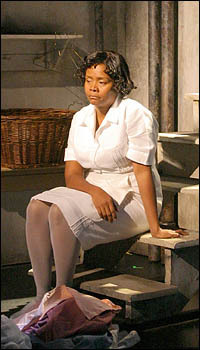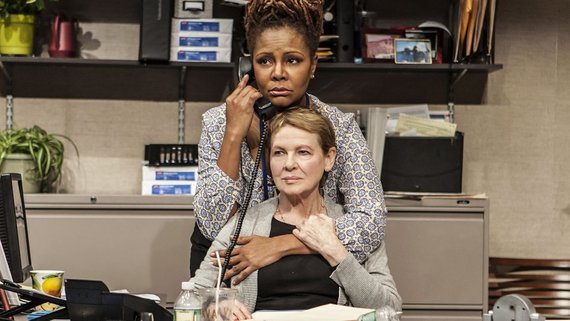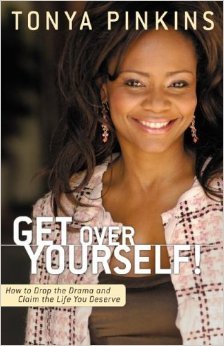The year 2015 saw the rise of #BlackLivesMatter and #BlackGirlsMatter, both movements helmed by powerful, fearless Black women. In 2016 I'm starting #BlackPerspectivesMatter.
Twice this year (but too many times in my career) my perspective as a Black woman was dismissed in favor of a portrait seen through the filter of the White gaze. Regrettably, I have exited Classic Stage Company's MOTHER COURAGE as a result.
When Black bodies are on the stage, Black perspectives must be reflected. This is not simply a matter of "artistic interpretation." Race and sex play too pivotal a role in determining who holds the power to shape representation.
CSC's severely truncated version eliminated Mother Courage's (and her children's) backstory, the use of her cart, and much of Brecht's war, leaving a woman whose motivations and character were tentative, at best. Mother Courage is the KING LEAR in the classical cannon of female dramatic roles; how could I walk away from what should have been one of the greatest roles in my career? I couldn't, until all my research, arguing and pleading for my character's full realization fell on deaf ears. And then I had to.
Brecht's drama follows a woman who supports herself and her children by selling goods to warring armies from a cart she drags through battle zones. Along the way, all three of her children are killed in the war. Mother Courage is the epitome of every poor, undocumented, battered, trafficked and immigrant woman hustling to provide for her family however she must. But at final tech rehearsal, I was told that this "Mother Courage" was "a delusional woman" trying to do the impossible. No longer an icon of feminine tenacity and strength, nor was she a fearless, capable Black female. Why must the Black Mother Courage be delusional?
The #CSCMotherCourage poster shows my face plastered on an image of the African Continent, the Democratic Republic of the Congo highlighted. What an opportunity to connect Brecht's anti-World War II play to the war in modern day Congo, Africa's first World War: my art meeting my activism. The chance to highlight the Chaplain's line, "If you want to sup with the devil you need a long spoon," as analogous to America's participation in the War in the Congo through our appetites for electronic devices which require the resources of Coltan, a natural resource raped and pillaged along with the bodies of Black women and children.
A Congolese flag is the only vestige of the Congo in this play. For me, the cultural misappropriation is unconscionable. Why must Africa, why must blackness itself, be generalized, reduced to a decorative motif?
This spring, I performed in RASHEEDA SPEAKING, a play purportedly about a Black woman's struggles working in a White medical office. But for the joy of performing nightly with Dianne Wiest, Patricia Connolly and Darren Goldstein, and the talk-backs I orchestrated with Michael Eric Dyson, Dr. Kimberly Crenshaw, Professor James Peterson and others, it was a soul-murdering experience. It is debilitating, explaining to non-Black people that their conceptions of Black people are not only inaccurate but dehumanizing.
Since RASHEEDA SPEAKING aired on PBS, people still call out "Rasheeda!" to praise my work, innocently forgetting (as each such acknowledgement reminds me) that "Rasheeda" was explained, in Jaclyn's climactic monologue, as the new word for "Nigger."
So who is speaking?
Mother Courage was not the star of this production. My subordinate position was shown most clearly when I attempted to perform an action flowing directly from the text: snatching a fur coat off an armed soldier's back. The actor playing the soldier would not "let" me do that. He exclaimed, "...I'd have to kill her!..." I fired back, "Brecht wrote it to illustrate that she is a 'Hyena of the War'" and at the performance, I snatched that fur coat. The play continued, but after that night, I was forbidden, by the director, from ever doing that again. Mother Courage reprimanded into submission to patriarchy?
Brecht did not write a delusional woman. He wrote a woman who seizes power at every turn, who forces her way through Hell, continuing in spite of every opposing force. My Mother Courage was left speechless, powerless, history-less and even cart-less. Why must images of Black women be held hostage in cages of White and/or patriarchal consciousness?
Many artists of color benefit from having "honorary White" status bestowed upon us for our work. This allows us to work alongside the best in the business and to be treated as equals. It is a struggle to partake of this status while straining to maintain integrity and authenticity to our own culture. Yet this status is often stripped when we are asked to portray our own people.
I am grateful to Olympia Dukakis, who has played Mother Courage seven times, for attending an early preview and giving me the permission to put my ferocity back into the role. However, my Mother Courage was neutered, leaving the real, unbridled Mother Courage wasting away inside me.
In this New Year I wish for White theater creatives humility to recognize that their perspectives alone are insufficient when portraying Black women and all "others"; that their misconceptions skew the presentations. I believe this actually harms real Black people in the world.
As we enter 2016, the collective White creative community has a responsibility to bring as many "others" into the room as possible, onstage and offstage, before, during and after decisions are made. Only then will the beauty of global humanity be heard, seen, and appreciated, so the truth wipes away misconceptions and misappropriations that, in turn, engender fear that foments violence around the globe.
The world cannot afford artistic visions of all White worlds, they simply do not exist. I want the theater to look like the city streets where I walk. I want to participate in theater that reflects and respects the fact that #OtherPerspectivesMatter.


